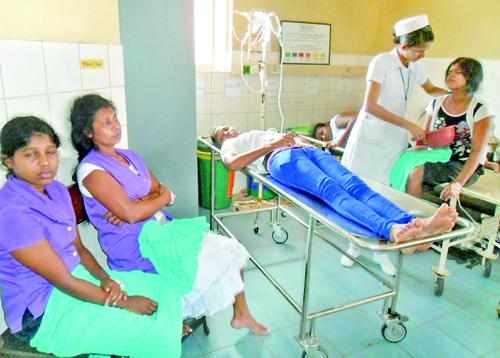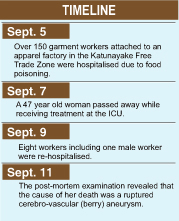News
Dead worker’s family finds it difficult to swallow JMO report
As Public Health Inspectors (PHIs) await a report on the investigations over the suspected food poisoning case at the Free Trade Zone (FTZ) where some 500 garment factory workers fell ill last week, questions have arisen over the death of one of the employees who was admitted to

The factory workers being attended to at the hospital. Pic by W. Hubert
hospital
PHI Union Secretary Senerath Bandara said that a sample of the food was sent to the Medical Research Institute in Borella and they hope to receive the report tomorrow.
“If the garment employees fell ill due to the food they had taken action will be taken against the suppliers,” he said.
Five hundred garment factory workers of the Next Manufacturing PVT LTD took ill on September 5 after allegedly consuming the mid day meal provided by the factory the previous day. The meal contained rice and curry with fish.
Eighty five of the workers were admitted to the Negombo District hospital and two among them were transferred to the ICU. One of them died, but the Judicial Medical Officer’s report said death was not caused by food poisoning, but by a rupture of a blood vessel.
K. Gunawathie (47) had worked at the factory for seven years, a factory worker told the Sunday Times.
On the morning of September 5, Gnanawathie had gone to the factory sick room not feeling too well, but the nurse in charge had asked her to go back to work. Later during the day several other workers also reported sick and were rushed to the Negombo Hospital, she said.

Chamila Thushari, Programme Coordinator of the Da Bindu Collective, a women’s right group
The factory management had asked the workers to report back to the factory after receiving treatment as there was a lot of work to be completed. The employee also said the management had asked them to apply for personal leave for September 5.
In the remote village of Uswewa Amaratunge gama in the Hambantota district bordering Embilipitiya, 21 year-old Ishan Lakshitha mourns the loss of his mother, whom he and the family believe died due to food poisoning.

Negombo Base Hospital Medical Superintendent Dr . Champa Aluthweena. Pix by M.D. Nissanka
“She always called me every day, especially in the afternoons but there was no call from her on that day,” Ishan Lakshitha said.
K.Gnanawathi was unconscious when she was admitted to the hospital ICU and she passed away two days later on September 7.
“The company management supplied a bus to transport the employees, dry rations for the family and they also promised us that they will take care of the whole thing, however they aren’t answering my calls now and they only sent us a few things,” Ishan added.
Meanwhile Chamila Thushari, Programme Coordinator of the Da Bindu Collective, a women’s right group activist in Sri Lanka’s Free Trade Zones said, “The company did not have the courtesy to provide proper funeral arrangements for the victim. The body was sent back to her home in a normal van that was hired. We strongly suspect that the embalming process had its faults too, because the body was not arranged in a proper manner. It had to be sent to another funeral parlour for the job to be completed.”
Negombo Base Hispital JMO Dr. M.N. Ruhul Haq who conducted the post mortem on September 7 declared that the cause of death was “a ruptured cerebro- vascular (berry) aneurysm’ (Bleeding in the brain due a ruptured blood vessel).

Negombo Base Hispital JMO Dr. M.N. Ruhul Haq
The JMO report further said that the victim showed no signs of trauma and that there was no evidence of food poisoning which could have contributed to the rupture of the pre-existing cerebro vascular (berry) aneurysm.”
However the post mortem report has been rejected by the family and some Katunayake FreeTrade zone unions.
“I have my doubts because, no one in the family had such an illness. I’ve known my mother all my life and she has never complained of headaches etc. and finally so many others were admitted for food poisoning too,” the son Ishan said.
Anton Marcus, Joint secretary of the Free Trade Zones and General Services Employess Union, said, “We have  requested the Ministry of Health to inquire into the post mortem report submitted by the consultant JMO.
requested the Ministry of Health to inquire into the post mortem report submitted by the consultant JMO.
“The deceased worker’s sister and her son have protested, saying she was admitted due to food poisoning and therefore they cannot accept the verdict. They want a reinvestigation to be certain of the reasons of death,” he added.
“We have requested the chief disciplinary officer in the health sector to initiate an immediate inquiry on this consultant JMO and his conduct in the said case,” he added.
Meanwhile Dr. M.N Ruhul Haq, said, “The medical reports stated that Gnanawathi suffered from epilepsy. She also developed diarrhoea after she ate a meal with fish. She received treatment from the OPD and was discharged. She later developed a fit and was brought back to the hospital. She was unconscious throughout and was on life support. The symptoms shown by her were vomiting, diarrhoea and headaches.”
He continued, “I conducted the post-mortem examination at 2.30 p.m. the same day (September 7), in the presence of two police officers, one from the hospital police division and the other from the Katunayake Police. There were two mortuary employees also present. A few relatives visited the mortuary to find out the findings.
“The examination revealed a weaker area of the blood vessel in the brain. This occurs from a person’s birth. With the progression of age the area gets weaker and it finally enlarges and ruptures. This is what happened in the case of the woman,” Dr. Haq said, adding that he had taken samples for the Histology and would be conducting further investigations.
“The death did not occur as a result of food poisoning. It coincidentally tallied with this event. The relatives of the victim are welcome to write to courts and try to obtain an order for another investigation,” Dr. Haq said.
Meanwhile when the Sunday Times team visited some of the factory workers who fell ill due to food poisoning, some were lying in bed in pain and others seated; they had just been given a saline drip.
Twenty- year-old *Amali from Moneragala, who has been at the factory for almost a year said, “I had a severe stomach-ache and I was vomiting continuously before I was admitted to hospital. It all started after we had our lunch that was served at the factory on September 4. The factory transported us to the hospital.”
*Namali Jeewita (17) was lying in her bed. She lifted her head with difficulty and forced a smile. She was suffering from a severe stomach pain and had been vomiting throughout. “We live by ourselves and a majority of us can’t cook so we eat the food provided by the factory. We work from morning till dusk six days a week and we earn about Rs. 12,000 a month,” she said.
Prior to our visit to the hospital, Ms. Thushari alleged that the factory management had deployed people to monitor the workers who spoke to the media.
“The company has threatened to dismiss the employees who speak to the media regarding this food poisoning issue,” she said adding that this was a violation of their basic right.
“The company says they have changed the caterers, however we believe that they have merely changed the line-up of those serving food.”
“Now they are trying to silence these workers. What is the future of these workers in this workplace? Have they no right to complain?” she asked.
A factory official who was visiting the ward questioned the Sunday Times team about interviewing the workers. “There would have been problems at the factory but we are doing our best for these workers. We have given them medical leave and we are hoping to take action against the caterers. We have replaced the old caterer.”
“The complaints of the people are similar to food poisoning. They complained of abdominal pain, diarrhoea and fainting, but we do not have documentary evidence yet, Negombo Base Hospital Medical Superintendent Dr . Champa Aluthweena said.
Several food samples were taken by the area Medical Officer of Health; we will receive the reports soon. We are doing the maximum we can for these patients,” Dr. Aluthweena said.
*(Names changed to protect identity)

